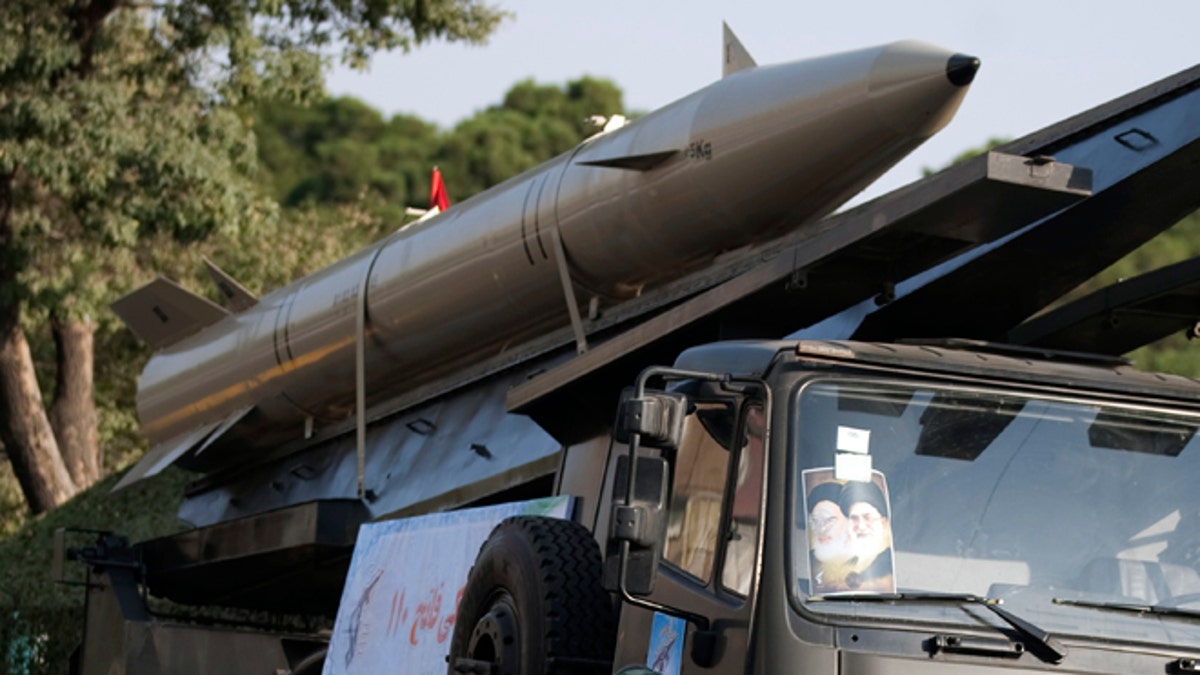
Sep. 23, 2011: An Iranian-made Fateh-110 missile on display during a war exhibition at Baharestan square in southern Tehran. (Reuters)
Iran’s president unveiled an upgraded version of one of its short-range surface-to-surface ballistic missiles Tuesday, amid a report that a top Israeli national security adviser met with a prominent rabbi hoping to persuade him in favor of an attack on Iran's nuclear program.
The upgraded version of the missile was revealed just weeks after it was test-fired, the country's state-media reported.
At the ceremony for Fateh-110, or Conqueror, Mahmoud Ahmadinejad told a group of defense officials that Iran wants to advance its defense technology "not in an aggressive context, but as a deterrence."
"We do not seek it for conquest, domination of neighboring countries and the world. We do not want it because of defiance," said Ahmadinejad, according to state TV.
The official IRNA news agency reported Tuesday that the new version of Fateh-110 has a quicker launch capability, a longer life and can be used in adverse weather conditions, but gave no other details. The missile has been in service in Iran over the past decade.
Iran claimed earlier this month that it successfully test-fired the missile, saying at the time that Fateh-110 has an improved accuracy to strike land and naval targets within a 185-mile range.
Iran considers both the United States and Israel as potential adversaries. Neither country has ruled out a military strike against Iran's nuclear program, which they claim is aimed at developing nuclear weapons. Iran says its program is for peaceful purposes.
An Israeli Shas Party official said Rabbi Ovadia Yosef, Shas' 92-year-old spiritual leader, met with national security adviser Yaakov Amidror last week to discuss the possibility of a strike. The official spoke Tuesday on condition of anonymity because the meeting was private.
He said he did not know the rabbi's response. Israeli leaders have consulted with Yosef, who has hundreds of thousands of followers, about weighty military decisions in the past.
The meeting came at a time of concern about a possible Israeli strike against Iran to stop its nuclear program. Prime Minister Benjamin Netanyahu has threatened military action, though officials stress no final decision has been made.
Since 1992, Iran has tried to set up a self-sufficient military program. The country's military leaders have said they believe future wars will take place in the air and on sea, and Tehran has sought to upgrade its air defense systems and naval power in anticipation of such a possibility.
Iran also has been pushing to upgrade its missiles, which already can target Israel and U.S. bases in the Middle East. The Pentagon released a report in June noting significant advances in Iranian missile technology, acknowledging that the Islamic Republic has improved the accuracy and firing capabilities of its missiles.
At Tuesday's ceremony marking the national day of Iran's defense industry, Ahmadinejad also unveiled several other new Iranian-made weapons, such as a naval diesel engine, a mortar launcher, a monitoring military intelligence system and tactical SUVs.
Iran also announced the start of construction on an air defense site, to be built in Abadeh, about 100 miles from the country’s uranium enrichment facility in Isfahan, Reuters reported.
Khatam al-Anbia, the engineering division of Iran’s Islamic Revolutionary Guard Corps will build the site that will eventually employ 6,000 people, Fars reported.
“If (the enemy) ever has the intent of attacking this soil, we will make the Persian Gulf their grave,” Mohammad Javad Askari, Abadeh’s governor reportedly said.
Defense Minister Gen. Ahmad Vahidi said Iran will commission a new generation of fighter jets, missiles, unmanned drones and submarines by the Iranian New Year, which falls in March 2013.
Iran's purported military advancements are impossible to independently verify because the country does not release technical details of its arsenals or rely on equipment from major international defense contractors.
Tehran occasionally announces additions to its arsenal, holds inauguration ceremonies, starts up new production lines and test-fires new missiles.
The Associated Press and Reuters contributed to this report.








































